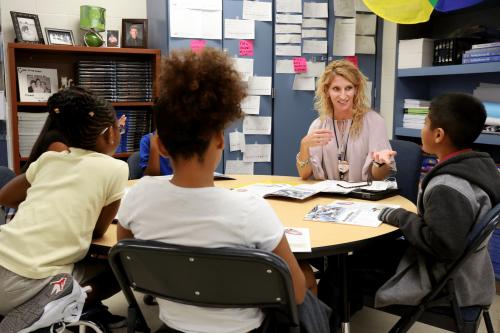The new year invited us to reflect on restoring balance in our lives. Political discord, climate crises, and nonstop social media often leave us drained. Modern life mirrors a system demanding constant productivity, squeezing out the pauses we all need. What if this year we made time for brief but essential breaks to recharge? We all need more recess.
Recess began in the 17th century when English schoolmaster John Brinsley introduced breaks for schoolchildren. By the 20th century, it became a staple in US schools, shaped by the Progressive Era and Child Study movements. Modeled after factory work breaks, recess wasn’t just about physical activity; it was essential for teaching social skills and balancing the school day.
School systems expanded post-WWII, and recess became the norm for elementary schools in the US, with students enjoying 60–90 minutes of daily unstructured play. By the 1980s and 90s, however, shifting educational priorities—accelerated by the No Child Left Behind era—replaced recess with increased schoolification. Over time, recess largely disappeared, driven by anti-recess policies and political rhetoric in places like New Jersey and Atlanta. Children became the canaries in the coal mines, testing how much could be accomplished without regular breaks.
The decline of recess isn’t just a concern for children; it reflects a larger cultural undervaluing of rest. Research shows that children benefit academically, socially, and physically from daily breaks, even as they progress to middle and high school. Similarly, adults need regular pauses to refocus, recharge, and maintain productivity. Yet, like children, adults are often denied this opportunity.
The mental health stakes are high. Ten percent of children (ages 3–17) and 18.2% of adults in the U.S. face high rates of anxiety, while 4% of children and 21.4% of adults experience depression. Recess provides a simple yet powerful way to address these challenges by offering time to reset and recharge. Despite the evidence, recess remains under threat in elementary schools across the US and is nearly nonexistent in middle and high schools.
The inequities surrounding recess also persist into adulthood. Recess is disproportionately withheld from poor, urban, and minority children due to academic interventions, punishment for incomplete schoolwork, or a lack of safe play spaces. Similarly, blue-collar and gig-economy workers often face irregular schedules and limited or no breaks. While most states regulate meal breaks, nearly half of all workers forgo them, facing the same pressures that push children to work without pause.
This undervaluing of breaks—from classrooms to factory floors—reveals a shared cultural problem. The factory model of schooling mirrors workplace conditions prioritizing output over well-being. Strikes by Amazon employees and other workers for better hours and conditions highlight the need to restore balance at every stage of life.
Building more recess into our lives and our children’s isn’t just about passing laws—it’s about meaningful changes. A recent Georgia study underscores the importance of pairing policy with practical strategies to prioritize breaks for all learners and workers.
The start of a new year reminds us of the power of stepping away—how pauses bring clarity, resilience, and joy. Whether it’s a child learning social skills, a worker recharging, or any of us seeking balance, recess is not a luxury but a necessity for mental and physical health. It helps us reset, reconnect, and thrive.
This year, let’s reclaim recess—not just as policy but as practice. By making time to pause, play, and reconnect in schools, workplaces, and daily life, we can create a healthier, more balanced society—one that values rest as much as achievement. Recess isn’t just a break; it’s a bridge to better living.
The Brookings Institution is committed to quality, independence, and impact.
We are supported by a diverse array of funders. In line with our values and policies, each Brookings publication represents the sole views of its author(s).








Commentary
We all need a little more recess
January 17, 2025